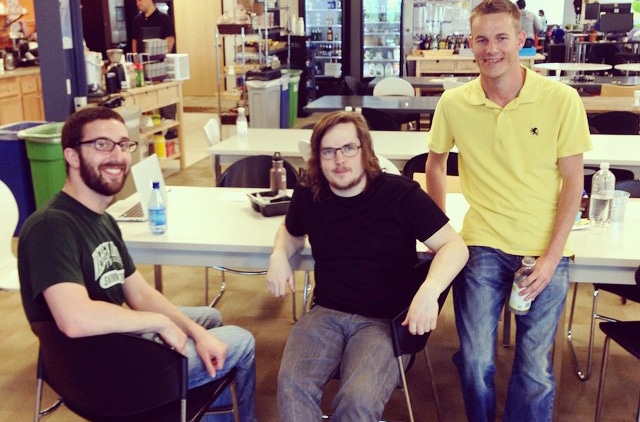Last Wednesday was a special day here at Udacity HQ. One of our very first front-end Nanodegree graduates Ben Halperin made a visit to our office. Ben’s an awesome guy: extremely friendly, super smart and very motivated. Ben didn’t waste any time, either; he landed a job in the health care industry shortly after graduating.
We’re working on an in-depth video about Ben’s path from mechanical engineer to web developer, but you can get to know Ben and be inspired by his career path below.

From left to right: Ben Halperin, Kevin Mayo (Udacity grad turned front-end dev), and Mike Wales (Udacity Course Dev )
I had absolutely no idea what I wanted to do when I started college, and I defaulted to engineering because I liked math and science. It seemed like a broad choice to open a lot of doors. I only started programming last April—I wasn’t happy with the jobs I had in mechanical engineering, and at my last job, a lot of the software we used was so poorly designed and frustrating. That made me want to figure out exactly what was going on with development behind the scenes.
I didn’t know too much about online courses, so I started looking around at what people were saying on various resources. The first class I took was at Code Academy, and from there I was looking for a computer science fundamentals class. I looked at MIT and Stanford’s intro courses, and then based on some reviews I found, I enrolled in Introduction to Computer Science at Udacity.
…the fact that I was doing all this while still working definitely impressed the companies I interviewed with. Having specific examples of things that I built is so helpful.
For me, there was an immediate love of programming and it just felt right—I’d never experienced that in my career, and right away, I knew it was something I wanted to do. It worked out well for me because I had taken just enough courses on my own (and had a decent background) that I felt well-prepared for the Nanodegree. So I never felt super frustrated or that I wasn’t getting enough help along the way. The last project in the Nanodegree was really challenging and getting started was a bit overwhelming. There was at least one other student that gave me some valuable feedback to get to the finish line.
I started glancing at job listings before graduating, but I didn’t do anything too serious until I completed the last project. Then I updated my resume and LinkedIn and tried to get as well-prepared as possible. I used any resource I could find on the job hunt, tried to figure out exactly what I was qualified for, and of course, tried to decide what was a possibility as far as job location.
People at Udacity went out of their way to give me advice to help with the job hunt and interview process. And having the community around the Nanodegree was helpful…
Most of the companies I interviewed with weren’t instantly familiar with Udacity, but they recognized the fact that I had projects and work on GitHub to show off. And the fact that I was doing all this while still working definitely impressed the companies I interviewed with. Having specific examples of things that I built is so helpful.
People at Udacity went out of their way to give me advice to help with the job hunt and interview process. And having the community around the Nanodegree was helpful—students would share LinkedIn profiles, resumes, and portfolios and provide feedback to each other.
Some people may think that $200 per month is a lot, but it’s almost nothing when you think about the opportunity it provides to advance careers. It’s win-win. Either you’re going to simply learn a lot or you’ll gain skills that will help you break into the field that you’re targeting.


